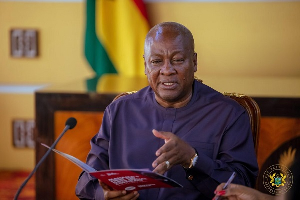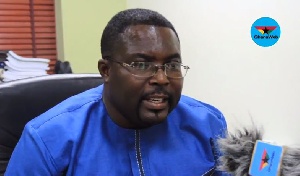Africa’s economic performance is dependent upon the dynamics and conditions in the industrialized world. But the forecasts of economic activities in the United States and Japan for 2002 and 2003 do not look good, as of now, according to latest International Monetary Fund, IMF report of world economic and financial surveys.
“GDP growth in Africa is projected to decline by 0.4 percentage points to 3.1 percent in 2002, equivalent to per capita income growth of about 0.5 percent,” so says IMF’s World Economic Outlook, WEO, launched Sept. 25, at a press briefing in Washington, DC, as part of the 2002 Annual Meetings of the Fund and the World Bank.
“While Africa will benefit from the expected strengthening of global activity, this may be offset by a combination of internal and external factors, including developments in commodity prices--- still the driving force of economic performance in most countries of the region,” the economic report indicates.
While rising oil price will help exporting countries in Africa to offset weak overall economic performance, the oil-importing ones would be the worse for it. Weak coffee and cotton prices in the world market also have affected the 2002 economic performance of the poor producing countries, according to the WEO.
Factors such as drought-related decline in agricultural output, conflicts and political instability, according to WEO, have played a role in weakening economic performance of a number of African countries. In this regard, the report notes that improvements in political stability and the absence of natural disasters would be the means towards positive economic performance in Africa.
While agricultural commodity prices have been weak, higher prices for gold and other metals have helped some African countries, such as South Africa, to offset the overall regional current account deficit, WEO indicates. It states, “… the regional current account deficit is expected to increase to 1.7 per cent of GDP in 2002.”
Again, the report cites weak commodity prices, high oil prices, in addition to high cost of external debt servicing, as responsible for the relatively high current account deficit of most post-colonial African countries.
On the optimistic side, the WEO report claims, that overtime, the debt-servicing cost “…should be reduced through the Heavily Indebted Poor Countries (HIPC) Initiative: through July 2002, some 22 (out of 26 eligible ) African countries had begun to receive nominal debt service relief totaling $32.2 billion, which, on average, will halve the net present value of their debt.”
In addition, “Recent commitments to increase international aid flows and raise the proportion provided as grants will also contribute to relaxing financing constraints,” the report indicates.
In spite of the expected chances for reducing debt-servicing and relaxing financing constraints, as indicated in the WEO, “…the HIV/AIDS pandemic--- as well as other infectious diseases--- has seriously affected prospects across the continent, particularly in southern Africa (including a significant reduction in life expectancy, notably in Botswana and Zimbabwe).”
According to the report, the above-stated range of problems confronting economic growth and expansion in Africa is accompanied by other setbacks such as “… low levels of investment and savings and limited direct investment inflows; poor infrastructure, including public utilities and the health and education sectors; pervasive market distortions (especially in agriculture); underdeveloped legal and regulatory frameworks; and weak governance.”
More importantly, the report points out that the problems mentioned above “are often self-reinforcing” to the extent that HIV/AIDS-induced low life expectancy reduces the returns on investment in education while political instability and bad governance exacerbate outcomes of natural disasters. These underlying problems do not augur well for macroeconomic stability of Africa, according to the WEO report.
Despite all the negativities working against Africa’s economic growth and expansion, the report identifies certain problems that need to be addressed to improve the overall growth and investment opportunities. It states, “…one key element is to make further progress in strengthening the economic infrastructure--- including basic market institutions such as the protection of property rights and, more generally, the rule of law, democratic accountability, the fight against corruption, and bureaucratic quality.”
Nature of approaches towards strengthening the economic infrastructure explains the differences in growth across countries in Africa, the report indicates.
Quite interestingly, the WEO report deduces that “Economic performance and human development are positively related to the quality of institutions.” This is to say that the better the quality of social institutions, the greater the chances for positive economic performance and progressive human development.
Some African countries including Botswana, Tanzania, Mozambique, Mali, Senegal and Uganda have taken some of the steps needed to meet the requirements for economic growth, according to the report. The important steps these countries have taken include good governance, economic liberalization, fiscal management, (including tax collection and public expenditure management) civil service reform and priority given to poverty reduction.
Fiscal discipline and greater central bank independence have been credited for Ghana’s progress towards reducing long-lasting high inflation, WEO 2002 report indicates.
Besides the country-level actions towards improving the economic infrastructure in some African countries, “…the international community is beginning to support these efforts through additional financial and technical assistance, including increased aid commitments announced in Monterrey and the G8 Africa Action Plan announced last June,” so says the WEO report.
Kenneth Rogoff, Economic Counsellor and Director of IMF’s research department announced establishment of a new division within the Fund to handle poverty issues of Africa. Responding to a question Wednesday, Sep. 25, at a press briefing to launch WEO 2002, Rogoff indicated that the Fund spends enormous amount of time on Africa. He stressed that issues of Africa are of enormous importance to the Fund.
In the final analysis, WEO 2002 states: “…WEO projections for African growth have in the past been consistently optimistic, and much will depend on further improvements in political stability as well as the absence of natural disaster.” But on the whole, the Fund is “cautiously optimistic” for economic recovery in 2003, according to Rogoff. He stated that economic growth in developing countries, as a whole, is expected to be 4.2 per cent in 2003.



















